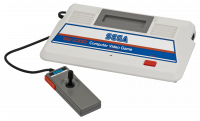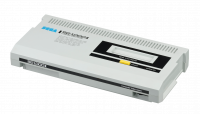SG-1000 Mods Wiki
m (Not possible on the SG-1000) |
mNo edit summary |
||
| (10 intermediate revisions by 3 users not shown) | |||
| Line 1: | Line 1: | ||
[[Category:SG-1000]] __NOEDITSECTION__ __NOTOC__ | [[Category:SG-1000]] __NOEDITSECTION__ __NOTOC__ | ||
<div class="mw-no-invert"> | <div class="mw-no-invert"><div style="word-spacing: 40px; text-align: center; margin: 10px;"> [[File:Sega_SG-1000_Logo.svg|link=|x95px]] </div> | ||
<div class="landing-page"> | <div class="landing-page"> | ||
| Line 6: | Line 6: | ||
[[File:SG-1000.png|200px]] [[File:SG-1000II.png|200px]] | [[File:SG-1000.png|200px]] [[File:SG-1000II.png|200px]] | ||
The Sega SG-1000 ("Sega Game 1000") is an 8-bit console from the third generation of video game consoles. It was Sega's first game console, launched in Japan on July 15, 1983 with later releases in New Zealand and Taiwan. | The Sega SG-1000 ("Sega Game 1000") is an 8-bit console from the third generation of video game consoles. It was Sega's first game console, launched in Japan on July 15, 1983 with later releases in New Zealand and Taiwan. Released alongside the SG-1000 was the SC-3000 ("Sega Computer 3000"), a home computer variant with a built-in keyboard and additional RAM that saw a release in Japan, Australasia and several European countries. A further revision, the SG-1000 II, was released in 1984 which updated the console's look. Although the SG-1000 was vastly overshadowed by Nintendo's Family Computer (released on the same day), it gave the company valuable experience in the home video game market and the console formed the basis for the vastly more successful Sega Master System. | ||
</div> | </div> | ||
| Line 15: | Line 15: | ||
===General Information=== | ===General Information=== | ||
* [[SG-1000:Creating Game Backups]] | * [[SG-1000:Creating Game Backups]] | ||
* <s | * <s> [[SG-1000:Playing Game Backups]] </s> | ||
* <s | * <s> [[SG-1000:Creating Game Save Backups]] </s> | ||
* [[SG-1000:Homebrew Games List]] | * [[SG-1000:Homebrew Games List]] | ||
* [[SG-1000:List of Games With Keyboard Compatibility]] | |||
</div> | </div> | ||
| Line 23: | Line 24: | ||
===Technical Information=== | ===Technical Information=== | ||
* [[SG-1000:SG-1000 Model Differences|Model Differences]] | * [[SG-1000:SG-1000 Model Differences|Model Differences]] | ||
* [[SG-1000:Video Output Notes]] | |||
* [[SG-1000:Connector Pinouts]] | * [[SG-1000:Connector Pinouts]] | ||
* [[SG-1000:Region Information]] | * [[SG-1000:Region Information]] | ||
| Line 28: | Line 30: | ||
<div class="boxed-list center-float clip-corner"> | <div class="boxed-list center-float clip-corner"> | ||
===Video | ===Video Mods=== | ||
* <s> [[SG-1000:TMS RGB Mod]] </s> [https://videogameperfection.com/products/tms-rgb-v2-board/ <sup>(1)</sup>] | |||
* <s | * <s> [[SG-1000:RGB Mod]] </s> | ||
* <s | * <s> [[SG-1000:Composite Mod]] </s> | ||
* <s | * [https://github.com/c0pperdragon/LumaCode/wiki/TMSdigitizer-(for-ColecoVision-and-MSX) LumaCode] | ||
</div> | </div> | ||
| Line 49: | Line 51: | ||
| <h3>Flash Carts</h3> | | <h3>Flash Carts</h3> | ||
<ul> | <ul> | ||
<li> [[BackBit Pro]] | |||
<li> [https://github.com/aotta/SD-1000 SD-1000] | |||
<li> [https://www.sc3000-multicart.com/index.htm SC-3000 Survivors MEGACART] | <li> [https://www.sc3000-multicart.com/index.htm SC-3000 Survivors MEGACART] | ||
</ul> | |||
||<h3>3D Printables</h3> | |||
<ul> | |||
<li> [https://www.printables.com/model/828077-sega-sg-1000-sj-200-controller-shell SJ-200 Joystick Shell] </li> | |||
</ul> | </ul> | ||
||<h3>Other</h3> | ||<h3>Other</h3> | ||
<ul> | <ul> | ||
<li> [https://console5.com/store/ | <li> [https://console5.com/store/console-cap-kits/sega/sg1000-cap-kits.html Capacitor Kit] </li> | ||
<li> [[Comparison_of_Power_Supplies#Third_generation_of_consoles|Replacement Power Supplies]] </li> | <li> [[Comparison_of_Power_Supplies#Third_generation_of_consoles|Replacement Power Supplies]] </li> | ||
<li> [[SG-1000:Controller Adapters]] </li> | <li> [[SG-1000:Controller Adapters]] </li> | ||
Latest revision as of 04:31, 2 November 2024

The Sega SG-1000 ("Sega Game 1000") is an 8-bit console from the third generation of video game consoles. It was Sega's first game console, launched in Japan on July 15, 1983 with later releases in New Zealand and Taiwan. Released alongside the SG-1000 was the SC-3000 ("Sega Computer 3000"), a home computer variant with a built-in keyboard and additional RAM that saw a release in Japan, Australasia and several European countries. A further revision, the SG-1000 II, was released in 1984 which updated the console's look. Although the SG-1000 was vastly overshadowed by Nintendo's Family Computer (released on the same day), it gave the company valuable experience in the home video game market and the console formed the basis for the vastly more successful Sega Master System.
General Information
Technical Information
Video Mods
Repair Guides
Flash Carts |
3D Printables |
Other |

